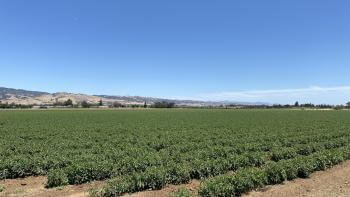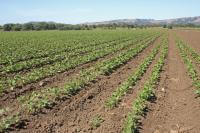Agriculture
Preserving Our Heritage in the Valley of Heart’s Delight
The Santa Clara Valley has a rich agricultural history and was once recognized as the “Valley of Heart’s Delight,” famous for its orchards and canneries. While agriculture in the valley looks different today than it did in the 1900s, our region continues to produce over $371 million annually in agricultural commodities. From nursery crops to a diverse variety of fruits and vegetables, and even livestock products, the agricultural lands and people who manage them continue to grow and raise high quality products for local and national markets.
Their productivity has not been without challenges however, and since the 1950s, urban development and sprawl have claimed many of Santa Clara Valley’s orchards and fields, leading to skyrocketing land values and development pressures. Farmers and ranchers also face obstacles such as an aging farming population and an increasing scarcity of crucial infrastructure. Increases in water rates and the number of small, disconnected agricultural parcels pose additional challenges to the County's working lands. In response, the Open Space Authority has renewed its dedication to protecting agricultural lands and finding ways to support farmers and ranchers through these challenges.
Working Lands
The Open Space Authority plays a lead role in identifying and preserving the region’s most important farmland and rangeland. In collaboration with farmers and ranchers, agricultural organizations, natural resource agencies and local, regional and state initiatives, we are identifying ways to support the environmental and economic success of the Valley’s agriculture.
Our efforts to help protect the most important remaining farmlands and rangelands focus on where production currently occurs and where it can be most sustainable in the long-term.
The Economics of Agriculture
Local agriculture is a vital economic resource in Santa Clara County, but the rate of growth and development places pressure on the region’s working lands. Over the last 20 years, farmland in the county has declined by 45% and fertile lands remain at risk for urban development. Of the remaining 27,000 acres of farmland, roughly half are considered at risk of development over the next 30 years.
To protect California’s irreplaceable agricultural lands, the Open Space Authority and the County of Santa Clara worked together to develop the Santa Clara Valley Agricultural Plan, an innovative approach to agricultural preservation. The Plan was funded in part by the State of California's Sustainable Agricultural Lands Conservation Program (SALCP).
The Ag Plan aims to protect local farmland from development and reduce greenhouse gas emissions, while growing a vibrant local food economy that contributes to our quality of life.
Our Approach
The Authority conserves farms, ranches, and other working landscapes to sustain the economic and environmental viability of local agriculture. We also work to identify and preserve the County’s most important farmland and rangeland by collaborating with farmers, ranchers, agricultural organizations, natural resource agencies, and local, regional and state initiatives.
Learn more about agriculture in the Santa Clara Valley Greenprint.
Strategies Include
- Protecting farms and ranches through fee purchase, conservation easements and other incentives.
- Managing Open Space Authority lands for natural resource protection and viable agricultural operations, and to model effective public-private partnerships.
- Supporting regional efforts to promote local sustainable food and economically sustainable working lands and developing public education and outreach campaigns to promote awareness about the economic and environmental value of working lands.
- Engaging in local, regional and state land use planning and policy projects to promote farm and rangeland protection and the economic viability of regional agriculture.
- Promoting a healthy and environmentally sustainable agricultural business sector via a wide variety of efforts.

What is a Conservation Easement?
A conservation easement is a voluntary, legal arrangement where a landowner and a land trust or public agency agree that the land will remain protected forever. Landowners still own the land, and the easement stays in place even after the land is sold or passed to the next generation. The land trust or public agency monitors the land at least annually to ensure that the conservation values stay protected. Learn more about our protected lands and existing conservation easements.
Work with us
If you are interested in working with the Open Space Authority on the donation or sale of a conservation easement or property, please contact us.
If you are interested in submitting a Request for Proposals (RFP) related to agriculture or grazing, please visit our Bids & Proposals page to be notified of upcoming opportunities.
